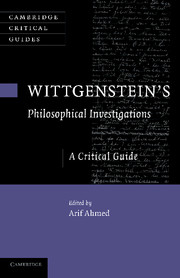Book contents
- Frontmatter
- Contents
- List of contributors
- Acknowledgments
- Introduction
- 1 From referentialism to human action: the Augustinian theory of language
- 2 What's doing? Activity, naming and Wittgenstein's response to Augustine
- 3 Measure for measure? Wittgenstein on language-game criteria and the Paris standard metre bar
- 4 Wittgenstein on family resemblance concepts
- 5 Wittgenstein on concepts
- 6 Wittgenstein vs contextualism
- 7 Wittgenstein and the linguistic turn
- 8 Rorty's Wittgenstein
- 9 Are meaning, understanding, etc. definite states?
- 10 Another strand in the private language argument
- 11 Deductive inference and aspect perception
- 12 Remembering intentions
- Bibliography
- Index
6 - Wittgenstein vs contextualism
Published online by Cambridge University Press: 06 July 2010
- Frontmatter
- Contents
- List of contributors
- Acknowledgments
- Introduction
- 1 From referentialism to human action: the Augustinian theory of language
- 2 What's doing? Activity, naming and Wittgenstein's response to Augustine
- 3 Measure for measure? Wittgenstein on language-game criteria and the Paris standard metre bar
- 4 Wittgenstein on family resemblance concepts
- 5 Wittgenstein on concepts
- 6 Wittgenstein vs contextualism
- 7 Wittgenstein and the linguistic turn
- 8 Rorty's Wittgenstein
- 9 Are meaning, understanding, etc. definite states?
- 10 Another strand in the private language argument
- 11 Deductive inference and aspect perception
- 12 Remembering intentions
- Bibliography
- Index
Summary
INTRODUCTION
Contextualism may be understood as a view about the meanings of utterances of sentences. The relevant notion of meaning is that of what is said by an utterance of a sentence, or as it is sometimes put, of the content of the utterance. To a first approximation, we may say that contextualism holds that the content of an utterance is shaped in far-reaching and unobvious ways by the circumstances, the context, in which it is uttered. In particular, two utterances of the same sentence might vary in content as a result of differences in their respective contexts that do not map onto any obvious indexical elements in the sentence.
The Wittgenstein of Philosophical Investigations and related texts spoke a lot about the context – circumstances, surroundings – of utterances. Was he a contextualist? Some contemporary contextualists think so. Indeed, some contextualists, most notably Charles Travis, believe that the central preoccupation of the later Wittgenstein was to bring out the reasons for, and the consequences of, the pervasive context-dependence of content. Now, as it happens, in the last twenty-five years a large number of philosophers of language, epistemologists and linguists, often with a quite different methodological orientation and set of influences from a Wittgensteinian like Travis, have come to see context-dependence as a deep-seated and enormously consequential feature of meaning. Many now believe that context-dependence goes well beyond familiar forms of indexicality, and properly understood, is at odds with traditional conceptions of semantics.
Keywords
- Type
- Chapter
- Information
- Wittgenstein's Philosophical InvestigationsA Critical Guide, pp. 109 - 128Publisher: Cambridge University PressPrint publication year: 2010
- 2
- Cited by

